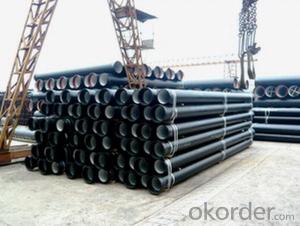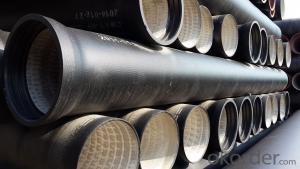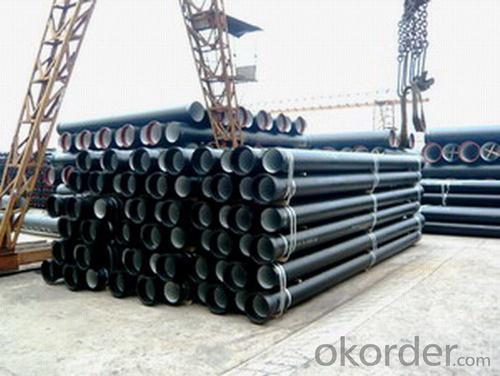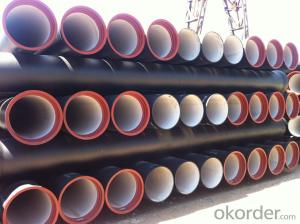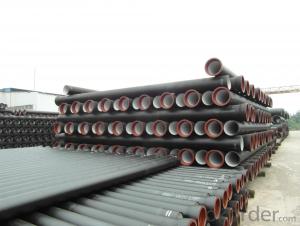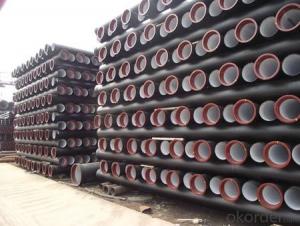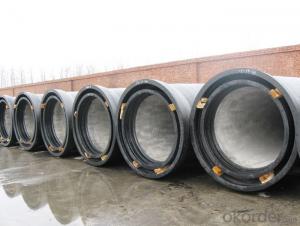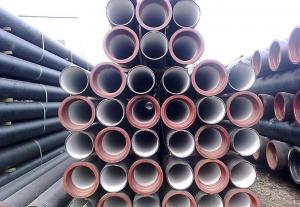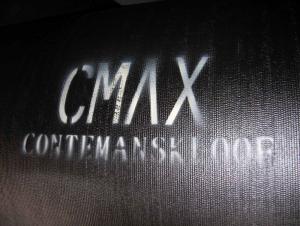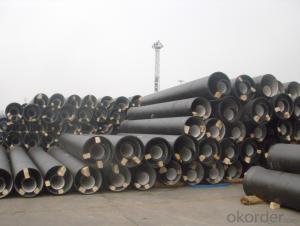Ductile Iron Pipe ISO2531 DN600 K9
- Loading Port:
- China main port
- Payment Terms:
- TT or LC
- Min Order Qty:
- 25 m.t.
- Supply Capability:
- 200000 m.t./month
OKorder Service Pledge
OKorder Financial Service
You Might Also Like
1,Ductile Iron Pipe Description :
1) Pipes confirm to ISO2531,K9 class,T type joint,6m long,with inside cements lining conform to ISO4179, outside Zinc spraying(130g/m2) and bitumen coating(70μm) conform to ISO8179.
2) Pipe ends: Spigot and socket ends, with 100% SBR rubber gaskets accoding to ISO4633
3) we can do third party inspection according to customer's request.
4) Our products have been sold to many international market, such as Middle East and South East Asia and Africa.
2,Main Features of the Ductile Iron Pipe:
1. Material: Ductile iron grade 500-7/ 450-10 in accordance with ISO1083
2. Standard: ISO 2531, EN545, EN598, ANSI, AWWA
3. Certificate: ISO9001, ISO14001, SGS, NSF, WRAS
4. Test: In accordance with ISO 2531 / EN 545 / EN598 and 100% water pressure test
5. Length: 6m or cut into 5.6m, 5.7m, 5.8m
6. Internal Lining: Cement, conform to ISO4179
7. External coating: Zinc + Bitumen, conform to ISO8179
3,Ductile Iron Pipe Images:
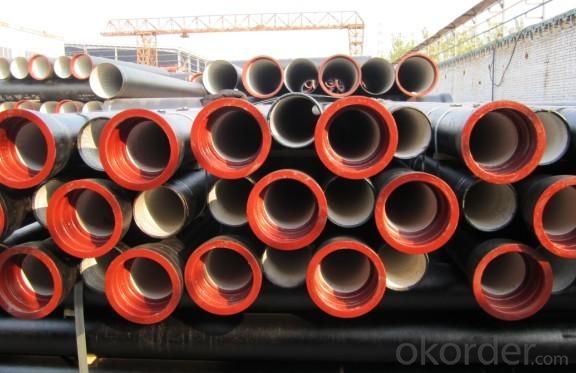
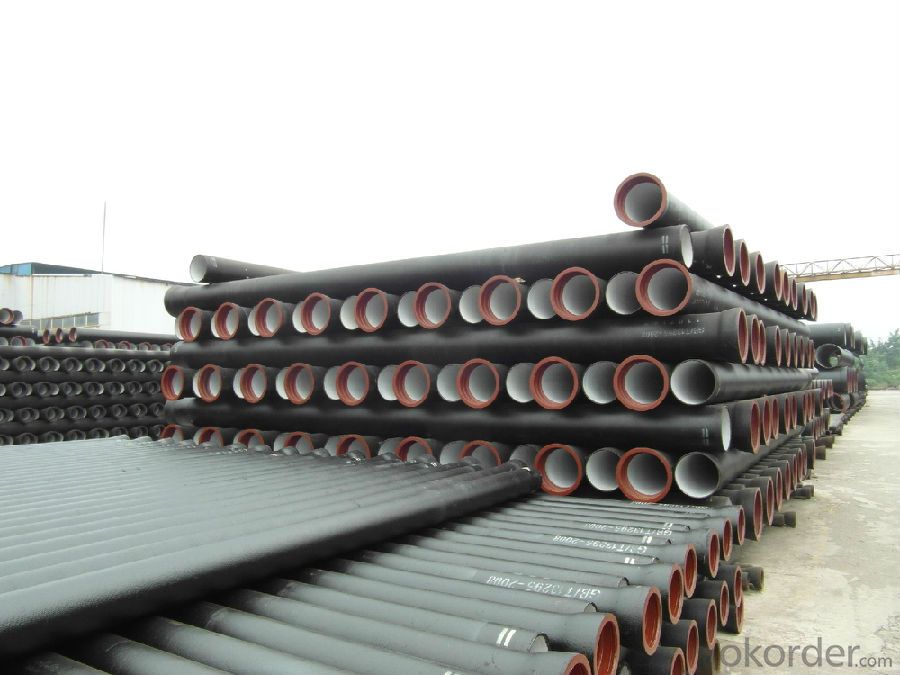
4. Ductile Iron Pipe Specification:
Standard: API SPEC 5L 44th eidtion,ASTM A252-98(2007)
Grade: A53 Grades A/B, ASTM A106 Grades B/C,ASTM A179
AWWA, C200, ASTM A139, ASTM A120, API 5L Grade B
X42, X52, X56, X60, X65, X70, X80, X100
Weld Alternatives: LSAW
OD size range: 6.4~44.5mm
Wall thickness: 406.4~1422mm
Length: 3 - 12 m according to requirment
5.FAQ:
We have organized several common questions for our clients,may help you sincerely:
1.Q:Why can you guarantee the inner of pipes can’t be corroded?
A: High alumina cement mortar lining and sulphate-resistant cement mortar lining. These two special linings are applicable to inner anti-corrosion for sewage pipes, improving resistance to erosion of the sewage components.
2.Q: Why would you choose ductile iron pipe rather than other pipe materials?
A:The reasons are obvious for that not only ductile iron pipe possesses the inherent strength and flexibility of ductile iron, combined with proven corrosion protection systems, but also the cost savings can be achieved from design to installation and commissioning.
- Q: The difference between HDPE pipe and ductile iron pipe
- Production process is different, ductile iron pipe mainly through intermediate frequency furnace heating, annealing, and then do cement lining cement lining production, the mechanism of cast iron pipe does not make cement lining.
- Q: How does ductile iron pipe perform in areas with high ground movement?
- Ductile iron pipe performs well in areas with high ground movement due to its inherent flexibility and strength. Its ability to bend and absorb ground movements makes it less susceptible to cracking or breaking compared to other rigid pipe materials. Additionally, the material's high tensile strength and durability ensure that it can withstand the stresses caused by ground movement without compromising its structural integrity.
- Q: DN300 how long is it for water polo and iron pipes?
- Cast iron pipe (Cast Iron Pipe) with the cast iron casting pipe cast iron pipe for water supply and drainage gas pipeline pipe fittings including cast iron casting with fatigue strength by continuous cast iron pipe from the cast iron pipe from the cast iron pipe sand metal two according to material with grey cast iron pipe, ductile iron pipe at the interface with flexible sealing interface LAN interface, self anchored interface, interface of the rigid flexible cast iron pipes rubber ring;
- Q: How does ductile iron pipe perform in sandy or unstable soils?
- Due to its inherent strength and flexibility, ductile iron pipe exhibits exceptional performance in sandy or unstable soils. Its composition, which includes a combination of iron, carbon, and small amounts of other elements, grants it superior mechanical properties compared to other pipe types. In sandy soils, where the ground may shift and cause pipe movement and deformation, ductile iron's high tensile strength and elongation characteristics enable it to withstand pressure and stress without fracturing or breaking. Its flexibility allows it to accommodate soil movement and settlement, reducing the risk of pipe failure. Furthermore, ductile iron pipe's resistance to corrosion makes it highly suitable for installation in sandy soils. The application of protective linings and coatings on both the interior and exterior of the pipe prevents corrosive elements in the soil from attacking the iron, ensuring durability and reliability in the long term. In unstable soils with varying compaction levels or weak load-bearing capacity, ductile iron pipe's sturdy construction provides stability and support. Its robustness allows for even distribution of loads, minimizing the chances of pipe deflection or collapse. Moreover, the joint design and sealing methods of ductile iron pipe, such as push-on joints or mechanical joints with rubber gaskets, offer excellent leak resistance and prevent soil infiltration. This further enhances its performance in sandy or unstable soils. Overall, the combination of strength, flexibility, corrosion resistance, and reliable joint systems makes ductile iron pipe an ideal choice for applications in sandy or unstable soils. It provides a long-lasting and efficient solution for the transmission of water and wastewater.
- Q: Can ductile iron pipes be used for bridge crossings?
- Yes, ductile iron pipes can be used for bridge crossings. Ductile iron pipes are known for their strength, durability, and resistance to corrosion, making them suitable for various applications, including bridge crossings. They can withstand heavy loads and provide a reliable conduit for water, sewage, or other utilities across the bridge.
- Q: Are ductile iron pipes suitable for wastewater treatment plants?
- Ductile iron pipes are highly suitable for wastewater treatment plants. They possess exceptional strength and durability, making them resistant to corrosion. Consequently, these pipes are an excellent choice for managing wastewater, which often contains corrosive elements. Moreover, ductile iron pipes boast remarkable tensile strength and can endure high pressure, critical for the transportation of wastewater in treatment plants. The flexibility of these pipes also permits easy installation and maintenance, ultimately reducing both cost and time required for wastewater treatment plants. In summary, ductile iron pipes are extensively utilized in wastewater treatment plants due to their durability, resistance to corrosion, and their ability to handle the challenging conditions present in such facilities.
- Q: Ductile iron pipe joint leakage
- The main reason for the leakage is that the installation is not in place, resulting in the loss of the apron. Sealed with cement or pipe head Hough section. Recommend the use of Hough section fast and convenient, and there is no menace from the rear.
- Q: Usage of ductile iron pipe expander
- Ductile iron expansion is mainly provided with large flexible, easy installation, the product main material for nodular cast iron, nodular cast iron is mainly through spheroidization and inoculation by spherical graphite, effectively improve the mechanical properties of cast iron, especially the plasticity and toughness increased, resulting in higher than the strength of carbon steel. The material mainly has high strength of plasticity and toughness, and its development at home and abroad is very fast, the output has exceeded cast steel and malleable cast iron, become second only to gray cast iron casting alloy material. Spheroidal graphite is obtained by spheroidizing and inoculation of nodular cast iron. It can effectively improve the mechanical properties of cast iron, especially improve the plasticity and toughness, so as to obtain higher strength than carbon steel.
- Q: Are there any limitations to the length of ductile iron pipe sections?
- Yes, there are limitations to the length of ductile iron pipe sections. The length of ductile iron pipe sections is typically limited due to practical considerations such as transportation, installation, and handling. Longer pipe sections can be more difficult to transport and maneuver, especially in areas with limited access or challenging terrain. Additionally, longer pipe sections may be more prone to damage during installation, as they can be more difficult to align and join properly. There are also limitations in terms of manufacturing capabilities. Ductile iron pipes are typically manufactured in standard lengths, which can vary depending on the manufacturer and the specific application. These standard lengths are typically designed to balance the needs of transportation, installation, and the overall performance of the pipe. Furthermore, longer pipe sections may pose challenges in terms of expansion and contraction due to temperature variations. Ductile iron pipes are susceptible to thermal expansion and contraction, and longer sections may experience greater stress and strain as a result. Therefore, while there is no absolute limit to the length of ductile iron pipe sections, practical considerations and manufacturing capabilities often result in the use of standard lengths that balance various factors such as transportation, installation, and performance.
- Q: Is the water cast iron pipe 100% for hydrostatic test?
- After the site installation, according to the standard to test pressure, but a lot of construction units are not pressure test
Send your message to us
Ductile Iron Pipe ISO2531 DN600 K9
- Loading Port:
- China main port
- Payment Terms:
- TT or LC
- Min Order Qty:
- 25 m.t.
- Supply Capability:
- 200000 m.t./month
OKorder Service Pledge
OKorder Financial Service
Similar products
Hot products
Hot Searches
Related keywords
